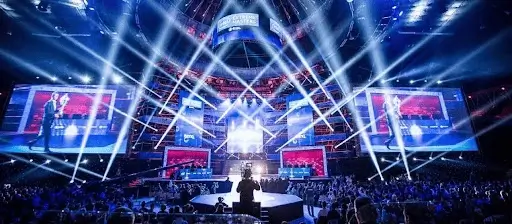Exploring the Intersection of Finance and Virtual Competition
With the development of technology, the boundaries between the financial world and competitive games are increasingly blurred, and both industries are cooperating. If once games were considered exclusively entertainment, now it is a global industry with powerful economies, where real money, investment and economic models play a central role. As tournaments and events evolve and reach new heights of popularity, along with increasing numbers of players and mass audiences, they attract serious financial interest. From esports organizations providing multimillion-dollar sponsorship to the growth of digital economies in gaming ecosystems, finance is now deeply rooted in the gaming competitive environment.

The Economics Behind Esports Growth
The e-sports industry has evolved from a subcultural phenomenon to one of the biggest economic forces. According to research, the global e-sports market currently accounts for about 1.5-2 billion dollars in revenue, and forecasts indicate even greater growth. The greatest income comes from sponsorship, media rights, souvenirs, as well as sales from tournaments. Do not asbestos about in-game economies that can be pressed into a separate market. Thousands of players buy and sell millions of dollars worth of in-game items every day, which is a very good source of income for developers.
Earning money for tournaments is sponsored by publishers and crowdfunded through in-game purchases. This applies in Dota 2 as well. This set-up is similar to conventional investment models where returns on inputs are expected. Esports teams are like startups, seeking venture capital, granting equity, and working toward an exit financially. Public listing by big names like FaZe Clan and Guild Esports, though, is a clear indication that the sector is maturing into a legitimate business. We have also covered Advanced Image Background Removal on our website.
Financial Tools for Virtual Optimization and Competition
Beyond professional organizations and sponsorships, players need financial tools to be successful. Top players spend their money on the best equipment, coaching, analytics software, and even psychological training to improve performance. At the same time, everyday players make financial decisions when they buy skins, battle passes, or set up custom gaming rigs.
Let’s look at precision-focused fps games like Valorant or CS2, where even a little mouse movement can affect performance. Professional players are often attracted by the way of platforms like valorant sens converter, and receive a percentage of sales when players use their promo code. In fact, online calculators and converters are a useful thing and help to fine-tune the game for yourself, and also help players smoothly move between different games or devices. These tools are part of the competitive advantage, and paid versions with tiered access and subscription models are a good economic tool.
The presence of these tools highlights how financial considerations permeate individual gameplay optimization. Gamers aren’t just players; they are investors in their own virtual results. Find valuable tips and strategies in our article about How Often Should You Change Your Passwords.
The Role of Digital Currencies and NFTs in Gaming Ecosystems

Virtual economies have expanded far beyond simple in-game purchases. Cryptocurrencies and NFTs are reshaping how value is stored and exchanged in competitive gaming environments. In blockchain-based games and metaverse platforms, players trade digital assets that hold real-world value. Some even earn income through “play-to-earn” models, creating a new fusion of labor and entertainment.
NFTs allow you to own unique in-game items or pictures, which is inherently similar to skins for weapons in Counter-Strike 2, the cost of which can increase. These assets are rare and can often be sold or traded in decentralized markets, integrating games into broader financial systems. Many are skeptical of this type of economy, but there is no denying that it works. The game has become a kind of environment, and digital economies in it are important components.
While speculative trading in gaming raises questions about regulation, security, and ethical gameplay, it’s impossible to ignore its role in shaping the current and future financial landscape of competitive gaming. Enhance your understanding by reading our in-depth post on Innovations in Hydration Technology.
Sponsorships, Betting, and the Institutionalization of Esports Finance
Large financial institutions, venture capital companies and betting companies are the hardest ways in the eSports ecosystem. Their strategies and policies are often similar to those of big brands in regular sports. Companies such as Mastercard, Intel and Red Bull sponsor both sports and esports tournaments, equalizing these industries. Well, and the usual, in eSports an important role is played by betting platforms that enrich the capital of teams and sponsor tournaments.
It is expected that not only e-sports betting will become a multi-billion dollar industry. As with traditional sports, they bring increased legitimacy and significant regulatory control, but other elements can also compete for major roles in the gaming economy. As everyone knows betting is not an entirely honest or transparent thing, so countries struggle with how to manage gambling laws in the context of digital competitions to make the game as transparent as possible.
Esports organizations are becoming more like regular sports teams. They manage player salaries, transfer fees, contracts, and image rights with careful financial and legal planning. Analytics are very important for these organizations. They study data like player performance and how fans interact to make smart business decisions. These groups invest in data teams to stay competitive and improve their financial situation.
Conclusion
The intersection of finance and virtual competition is no longer theoretical, but has become an important aspect of modern digital culture. Esports has not only become a global industry, but also created its own economy, where investments, analytics and money strategies are present. Regardless of the elements used, the virtual battlefield is now becoming a financial arena capable of competing with other industries. As the gaming industry continues to evolve, stakeholders – from players to investors – must navigate an increasingly complex, data-driven and monetized environment. Understanding these dynamics is very important, especially for those who want to succeed in a virtual competitive environment. You can visit Fintechzoom.com for more trending posts.



